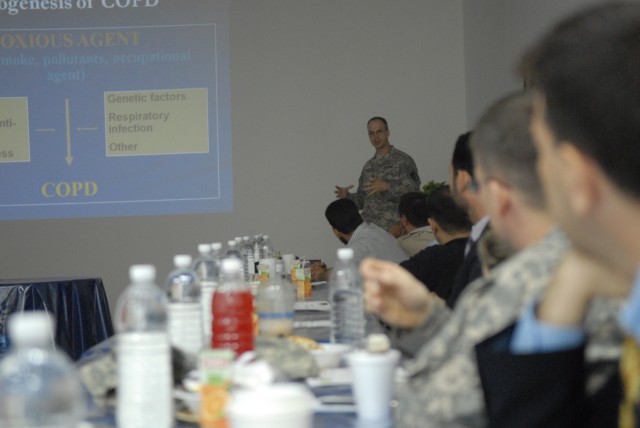CONTINGENCY OPERATING BASE SPEICHER, TIKRIT, Iraq - It might seem insignificant to most people. A handful of Iraqi Doctors, an assortment of American medical professionals, a day of lecture and discussion, but small, frequent gatherings like this are having a far-reaching effect on the medical community in Salah Ad Din province.
"During last year's conference I heard about multi-drug resistant treatments of tuberculosis," Dr. Muhammed Sajed, director of the provincial tuberculosis center, said. "It changed my view and treatment of the community. From that time I changed the way I treated second-line patients after four years of treatment. It is saving lives!"
Statements like Dr. Muhammed's are becoming increasingly common in Salah Ad Din province as the Provincial Reconstruction Team and 3rd Brigade Combat Team continue to coordinate educational medical conferences for Iraqi physicians both on American bases and in Iraqi hospitals. The latest conference in early May focused on prevention and treatment of respiratory disease, drawing 16 Iraqi medical specialists from across the province to COB Speicher. Iraqi and American physicians both lectured on topics ranging from tuberculosis to asthma in a conference that served as a model for the impact this type of educational venue is having.
Dr. Ali Abbas, the sole oncologist for Salah Ad Din province, said that bringing different specialties together was the value of these conferences. By doing so, he said it improved general knowledge on different disease models that they may not normally see in their field of medicine, thus helping them see old problems in a new light.
"When you have certain specialties, there's certain general information you are going to forget," Dr. Ali said. "So you need to be updated. Medicine is like a sea; you cannot sail in every part [all the time]."
The only downfall to the medical conferences, Dr. Ali said, was that only one or two a month are not enough.
"In fact, we need more and more lectures," Dr. Ali said. "There should be continuing medical education... we need more frequent lectures."
Echoing the desire of Dr. Ali for more educational conferences was Dr. Muhammed, who underscored the importance of having these conferences continue to include lectures from American physicians.
"In our Iraqi national [health] conferences, our experiences are close to each other," Dr. Muhammed said. "We are in need of conferences like this, especially with Americans, because the Americans have experience in managing the health problems."
The American physician hosting the event was the 3rd Brigade Surgeon, Lt. Col. Lance Cordoni, who is responsible for partnering the US military with the Iraqi Ministry of Health for healthcare development in Salah Ad Din province. Cordoni said they focused efforts of the Provincial Reconstruction Team and military to bring educational venues like this to Tikrit showed their success in the overwhelming requests for more of the same.
"Before the conference was even over we had requests from the Iraqis on topics for future conferences," Cordoni said. "Tikrit is the major nerve center for Salah Ad Din medicine... this is the logical place to start."
Andy Demma, a public health advisor from the Centers for Disease Control and a member of the Provincial Reconstruction Team, lectured at the conference on the recent novel H1N1 Influenza outbreak in the United States. He said that the approach of small, frequent medical conferences will have a positive cumulative effect to help bring the Iraqi physicians of Salah Ad Din to the forefront of current medical practices.
"Simple, small things can add up in the long term to incorporate them back into modern medicine," Demma said. "I think smaller conferences show them that not everything has to be a big production."




Social Sharing